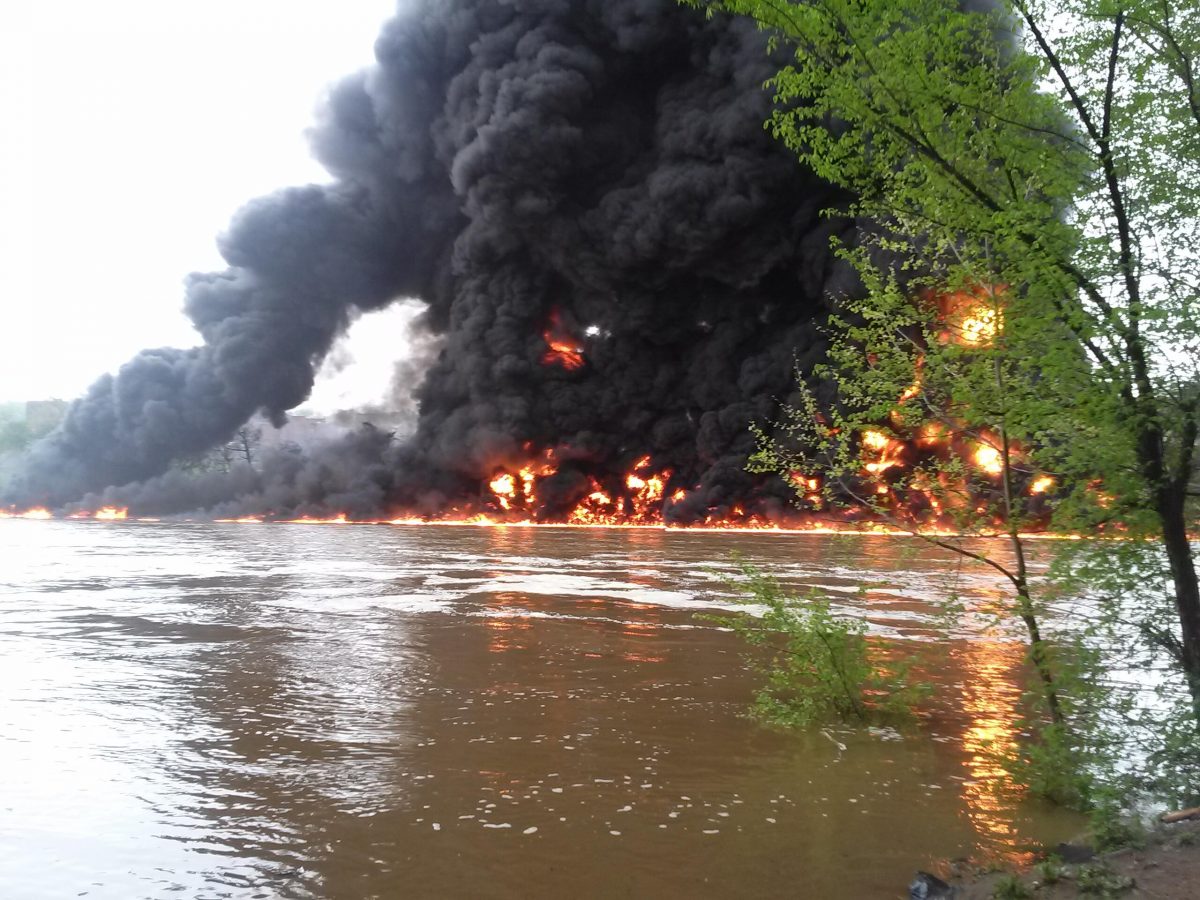Year after year, coal train derailments, sewage pipeline leaks, pesticide runoff, and other toxic substances continue to poison the James River. In a summer that’s seen multiple toxic train derailments and a two-week ban on swimming due to multiple sewage pipe breaks, climate activist Aaron Linas asks, when will we start treating our river better?
It’s time we take seriously the health of the James River. In the last two months there have been three train derailments in downtown Richmond (June 8, Rocketts Landing; June 30, Hollywood Cemetery; and July 23, Oregon Hill), resulting in multiple cars landing in the river and 500 tons of coal dumped into the Kanawha canal. In two weeks alone, there were two separate sewage pipeline leaks (July 24, Pipeline Trail; and July 29, Goochland), causing the city government to place restrictions on recreational use of the river. Richmond residents were banned for almost two weeks from swimming, rafting, and fishing in the James, or any activity that resulted in getting their skin wet. Virginia health officials have now lifted restrictions, but swimming is still discouraged.
This isn’t the first time the city has restricted swimming, and up until Ralph White’s tenure, it was flat-out banned to go in at all. In 1980, White became the James River Parks manager with a yearly budget of $3000 and a city prepared to sell off wetland parcels for development. Under his guidance and with dedicated volunteers, the park expanded its trail network, built accessible pathways, and conserved Richmond’s urban wilderness. What was once a shunned place has now become a centerpiece of the city.
There is an unspoken history of the river being used as a dumping ground for toxic and sewage waste. The forgotten Kepone plant in Hopewell was manufacturing a DDT relative from 1966 until 1975; in this time they poisoned dozens of workers and dumped over 200,000 pounds of Kepone into the river. Dredging efforts were abandoned for fear of disturbing the settled waste. After being covered with additional dirt, it still sits underneath the river floor. As Avail sang in 1998, “There’s kepone in the river, but the river’s still moving east…”
There are a few other pollutants that live on the bottom of the James, including over 70,000 gallons of crude oil from the 2014 Lynchburg train derailment. Seventeen rail cars carrying volatile crude oil derailed in the downtown area, with three going directly into the James. The images of the river on fire raised concerns over the danger of “bomb trains,” the possibility that cars carrying highly explosive bakkan shale oil from North Dakota might erupt and cause large-scale fires. Our energy reliance on natural gas escalates the potential for a devastating citywide catastrophe. Richmond is lucky that none of the last three train derailments involved fracked gas or oil.
West of Richmond, 60 miles upstream in the town of Bremo, is a coal-fired power plant owned by Dominion. In 2016, Dominion was granted a permit by the Department of Environmental Quality to drain 255 million gallons of coal ash wastewater, containing toxic chemicals like arsenic, selenium, and hexavalent chromium, from the 85-year-old Bremo facility’s ponds into the river. The dumping levels exceeded state-accepted standards of industrial discharge, but DEQ and Dominion claimed the river could sufficiently dilute the heavy metals and not effect drinking water. Dominion has another coal-fired power plant 17 miles downstream in Chester, where for years heavy metals from the coal ash ponds have been leaking into the surrounding waterways. After legislation passed in 2019 that requires Dominion to clean up all of its coal ash ponds within the Chesapeake Bay watershed, any new coal ash from the Chester power plant is now disposed in a landfill.
The most widely known river polluter is the combined sewer overflow system (CSO) that routinely dumps untreated wastewater after a storm. It is common knowledge that after a heavy rain you should avoid swimming in the river, for fear of contracting MRSA or a staph infection. Formal complaints about CSO began in the 1970’s with Newton Hooper Ancarrow, who owned a boat landing on the south side of the river. The landing is now known as Ancarrow’s Landing and sits across the James from Rocketts Landing. In 1974, he directed a film, The Raging James, that focused on the channelizations of waterways and its disruption of environmental health – a debate that is currently underway about Reedy Creek. He would go on to formally petition city council to address the damages CSO had on the river and his business. The city council, in response to his nuisance, placed an eminent domain acquisition on his property — forcing the sale of Ancarrow’s Landing and surrounding area to build where is now the wastewater treatment facility.
Governor Ralph Northam’s allocation of $50 million from the coronavirus relief money for Richmond combined-sewer cleanup is a fraction of the help needed to end overflows into the James River. The City of Richmond had previously asked for $883 million to build infrastructure that can capture, store, and treat heavy storm water flows by separating street runoff from sewage, and bring the city in compliance with new state mandates to end CSO discharge by 2035.
If the Governor and Mayor are sincere about ensuring reliable access to clean drinking water and rebuilding our aging infrastructure, then they must declare a state of climate emergency. Addressing CSO has been evaded, if not ignored, due in part to political unwillingness, as well as the exorbitant cost and planning of a project that is likely to disrupt many areas of the city. This procrastination has increased the cost of repairs, and leaves city operators with no choice but to dump untreated raw sewage into the river. It took two days to inform the public that a 40-inch pipe in Goochland leaked 300,000 gallons of undiluted raw sewage into the James. That’s straight up from the toilet to the river.
Beyond the pollutants of coal, natural gas, and CSO, there are other dumping actors. The juvenile, women’s, and men’s prisons in Powhatan have been permitted to discharge septic treated wastewater into the James for decades. They maintain this is within compliance, but rumors of malfunctions and excess flow dumping untreated wastewater go unnoticed. Runoff from commercial farms add pesticides, sediment, and animal waste.
A discussion about the health of the James River must include all existing actors and aspects of water infrastructure. If we continue to allow permitted or accidental dumping of pollution into our waterways, we reverse the work of people like Ralph White and the volunteers who spent decades to get us a swimmable river. The history of James River pollution must be retold for each generation to ensure we don’t forget or replicate such poor methods of waste management and energy consumption. A city without drinkable water is not fit for humans.
Note: Op-Eds are contributions from guest writers and do not reflect editorial policy.
Top Photo by Erin Ferrell, via Twitter



